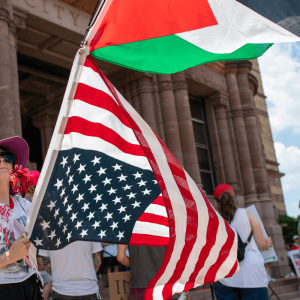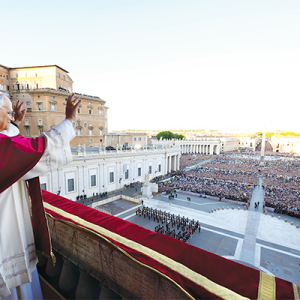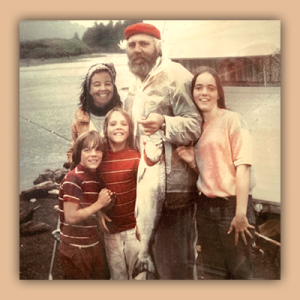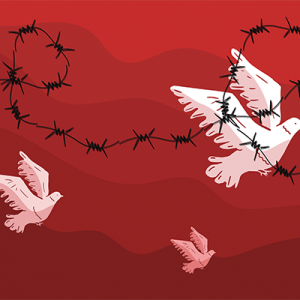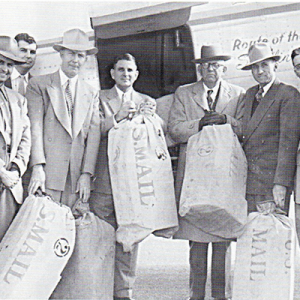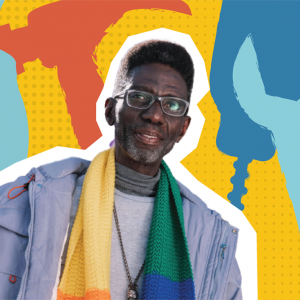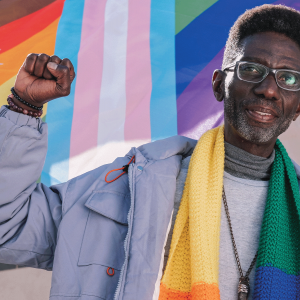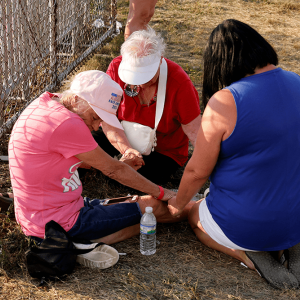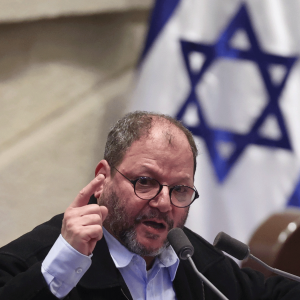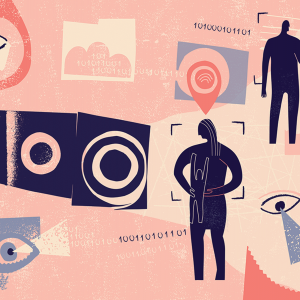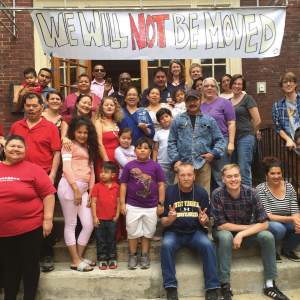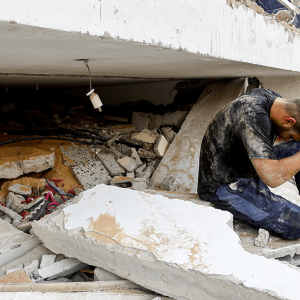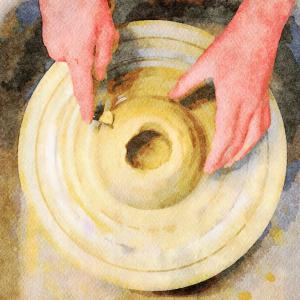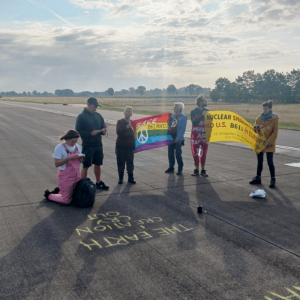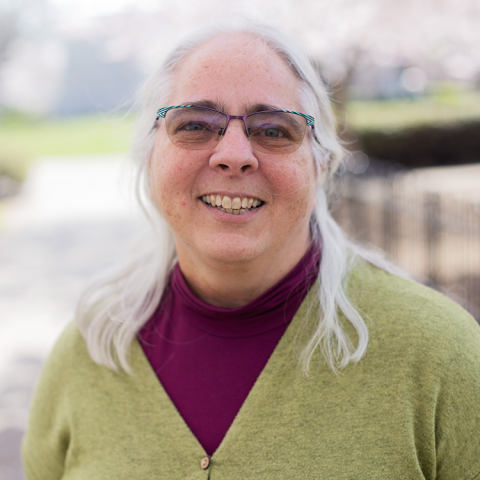
Rose Marie Berger is a Catholic peace activist and poet. She has been on Sojourners staff since 1986, and worked for social justice movements for 40 years. Rose has rooted herself with Sojourners magazine and ministry. She has written hundreds of articles for Sojourners and other publications and is a sought after preacher and public speaker. After living in Washington, D.C., for 35 years, she moved to Oak View, Calif., in 2022.
Rose’s work in Christian nonviolence has taken her to conflict zones around the world. She is active in the Catholic Nonviolence Initiative, a project of Pax Christi International, and served as co-editor for Advancing Nonviolence and Just Peace in the Church and the World, the fruit of a multiyear, global, participatory process to deepen Catholic understanding of and commitment to Gospel nonviolence. Her poetry has appeared in the books Watershed Discipleship: Reinhabiting a Bioregional Faith and Practice and Buffalo Shout, Salmon Cry: Conversations on Creation, Land Justice, and Life Together. She is author of Bending the Arch: Poems (2019), Drawn By God: A History of the Society of Catholic Medical Missionaries from 1967 to 1991 (with Janet Gottschalk, 2012), and Who Killed Donte Manning? The Story of an American Neighborhood. She has also been a religion reviewer for Publishers Weekly and a Huffington Post commentator. Her work has appeared in National Catholic Reporter, Publishers Weekly, Religion News Service, Radical Grace-Oneing, The Merton Seasonal, U.S. Catholic, and elsewhere. She serves on the board of The International Thomas Merton Society.
With Sojourners, Rose has worked as an organizer on peace and environmental issues, internship program director, liturgist, community pastor, poetry editor, and, currently, as a senior editor of Sojourners magazine, where she writes a regular column on spirituality and justice. She is responsible for the Living the Word biblical reflections on the Revised Common Lectionary, poetry, Bible studies, and interviews – and oversees the production of study guides and the online Bible study Preaching the Word.
Rose has a veteran history in social justice activism, including: leading the first international, inter-religious peace witness into Kyiv, Ukraine, following the outbreak of war in 2022, organizing inter-religious witness against the Keystone XL pipeline; educating and training groups in nonviolence; leading retreats in spirituality and justice; writing on topics as diverse as the “Spiritual Vision of Van Gogh, O'Keeffe, and Warhol,” the war in the Balkans, interviews with Black activists Vincent Harding and Yvonne Delk, the Love Canal's Lois Gibbs, and Mexican archbishop Ruiz, cultural commentary on the Catholic church and the peace movement, reviews of movies, books, and music.
Rose Berger has taught writing and poetry workshops for children and adults. She’s completed her MFA in poetry through the University of Southern Maine’s Stonecoast program. Her poetry has been published in Sojourners, The Other Side, Radix and D.C. Poets Against the War.
Rose grew up in the Central Valley of California, located in the rich flood plains of the Sacramento and American rivers. Raised in radical Catholic communities heavily influenced by Franciscans and the Catholic Worker movement, she served for nine years on the pastoral team for Sojourners Community Church; five as its co-pastor. She directed Sojourners internship program from 1990-1999. She is currently a senior editor and poetry editor for Sojourners magazine. She has traveled throughout the United States, and also in Ukraine, Israel/Palestine, Costa Rica, the Netherlands, Northern Ireland, Bosnia, Kosova, Peru, Colombia, Venezuela, and El Salvador visiting primarily with faith communities working for peace in situations of conflict.
Rose was born when atmospheric CO2 was at 319.08 ppm and now lives with her wife Heidi Thompson in Oak View, Calif., in the Ventura River watershed on traditional Chumash lands. Learn more at rosemarieberger.com.
Rose’s articles include:
- Pursuing the Secret of Joy: What is joy when it's not promiscuously tied to happiness, Hallmark, or hedonism?
- Why Our Faith Delegation went to Ukraine?: Our public message was simple: “We have come to Kyiv in solidarity to pray for a just peace.”
- Nonviolence in Najaf?: Will we recognize an Islamic peace movement when we see it?
- Of Love's Risen Body: The poetry of Denise Levertov, 1923-1997
- Glimpses of God Outside the Temple: The spiritual vision of Vincent Van Gogh, Georgia O'Keefe, and Andy Warhol.
- Damnation Will Not Be Televised: Almost everything I know about hell I learned from watching Buffy the Vampire Slayer
Speaking Topics
- Christian nonviolence, peace, war
- Catholic Nonviolence Initiative
- Climate change, creation care, watershed discipleship
- Bible study, liturgical year
- Poetry
- Spirituality and social justice
- Any topic covered in Sojourners magazine
- Catholicism
Speaking Format
- Preference for virtual events, but willing to discuss in-person events on case-by-case basis
Posts By This Author
Angels and Humans Unite!
The Nativity is a nexus of spiritual power in more ways than one.
I’VE HEARD A very old story about Christmas: When Adam and Eve were in the garden, they often sang with the angels, the most perfect sound ever created. When they were banished, the song fractured. Neither choir—human nor angelic—could sing perfect praises to the Creator of the universe alone.
On Christmas, however, a miracle occurs. The heavenly hosts reunite with mortal shepherds—the band is back together, the choir again complete. At least for a day, heaven and earth are reconciled in song.
Why is this memory of the Nativity important for us now?
Big Brands Fuel the War Machine in Gaza
IN 2003, RACHEL CORRIE, 23, a U.S. college senior, was killed by a bulldozer. This was not a freak accident. Corrie was in Gaza with a team of peace activists, nonviolently protecting Palestinian homes from demolition. The bulldozer operator was an Israel Defense Forces soldier. The Cat D9 was made in East Peoria, Illinois. Corrie’s family subsequently sued Caterpillar for war crimes and extra-judicial killing — without success.
This June, the United Nations released an investigation into the corporate machinery sustaining Israel’s ongoing anti-Palestinian project. The report adds 48 international corporations, institutions, and charitable organizations to a list of more than 1,000 corporate entities that, violating international law, profit from Israel’s project to displace, replace, and now eliminate Palestinians.
We Can't Bomb Our Way to Peace in the Middle East
We also need to be clear: Iran did not possess a nuclear weapon. Iran was enriching uranium needed for such a weapon and had recently increased its production, but intelligence assessments concluded they had not made a final decision to produce a bomb. In fact, the assessment said Iran would be more likely to produce a weapon if the U.S. attacked its uranium supply.
Can Pope Leo Restore the Genius of American Catholicism?
Right now, our church is sick from within.
TWENTY-FIVE YEARS ago, I visited the city of Chiclayo in northern Peru, then famous for its mercado de los brujos. Now it’s famous for producing Pope Leo XIV, new spiritual leader for 1.4 billion Catholics.
I was shocked when the conclave chose as pope Robert Prevost, a Chicago native and a Peruvian citizen. Prevost first went to Peru in 1985, when he was 30. After he served in various roles for his Augustinian order in northern Peru, Pope Francis appointed Prevost to the Diocese of Chiclayo, where he became bishop and served for nine years. Prevost worked with the Peruvian conference of Catholic bishops and on the conference’s economic council and commission for culture and education. In 2023, Pope Francis appointed him head of the Pontifical Commission for Latin America, putting Prevost in much closer contact with bishops across the continent. That same year, he became a cardinal. He is not “the first American pope”: Jorge Bergoglio, from Argentina, was. But Prevost, as the first U.S.-born pope, signals that Catholicism in the United States has come of age in the global Catholic Church.
Prevost-the-missionary-cardinal appears well-suited to institutionalize Pope Francis’ prophetic and expansive vision. However, Prevost-the-first-U.S.-born-pope seems more unpredictable.
After the Death of a Good Father
I found a note where Dad explained why he kept so much stuff.
IT'S AN IMPOSSIBLE task to write and offer a eulogy for one’s father. When a father dies — especially a good one — it’s like mountains crumbling, the sun going out, like a tsunami. There is life after all these things — but essentially a world is ending. It is catastrophic.
And yet. We also hold the ancient wisdom that we are made of ash and the breath of God and to ash and the breath of God we shall return.
John Henry Berger, son of Catherine Helena Gingrich and Henry Joseph Berger, has returned to ash and the breath of God.
While sorting through my Dad’s den, we found one file folder marked “funerals.” In it was a copy of a scripture passage that he had starred and highlighted. It begins, “Happy the one who has found a woman of worth. Her value is far beyond rubies. Her husband trusts her judgment; therefore he does not lack income. She brings him profit, not loss, all the days of her life.” In it we hear his humor and his wisdom. Even when he wasn’t acting out of his best self, he knew he had married Barbara Ely Bird, a strong-willed woman of worth, warmth, wisdom, and humor, one whose value is far beyond rubies or precious jewels. Dad loved Mom.
I Want To Know I Belong, Especially In This Era of Tyrants
Love, etymology, orality, and the mystery of God.
I LOVE WORDS. I love etymological dictionaries packed with word genealogies. I love that apricot is a cousin to precocious, kitchen, and charcuterie. That the word word (from the Old English) is rooted in utterance and promise, in the theological sense. As in, to give one’s word.
Words spoken are different creatures than words written. Christians designated written words as more trustworthy than oral composition, but early Judaism prioritized oral transmission of sacred words — as many Indigenous communities do still. But written words (like these) can be controlled and manipulated. Writing prevents the breathed utterance from passing through the orator’s flesh to be inhaled by the communal body. Orality is to literacy as wildfire is to candle flame.
Maybe that is why I moved heaven and earth in 2000 to hear Irish poet Seamus Heaney read in person, accompanied by Liam O’Flynn on the uilleann pipes. Having studied Heaney’s written word, especially the collection Station Island, I wanted to hear the man himself, to hear him orate (from the roots of utter and praise before an assembly). I wanted to inhale his language (tribal and tongue).
How Christians Can Subvert the Aims of a Tyrant
We must be countercultural in an authoritarian regime.
FOR THE FIRST time, Americans have elected a wannabe dictator as president. Donald Trump is committed to and now capable of ending democracy as we know it. Trump is the one the “new authoritarians” have been waiting for. What now?
First, as of January 2025, the United States is on track to become an electoral autocracy. Electoral autocracies have multiparty systems and independent institutions that over time lose sufficient power to hold the executive branch accountable for its corruption or restrict its lawlessness. The Republican trifecta in November was not the presidency, Senate, and House. It was the White House, Congress, and Supreme Court. This win enables what political scientists call “state capture” by anti-democratic forces.
Whatever else we do, we must reorient our political map.
Can I Do Right by a Community ‘In Absentia’?
Leaning into land tenancy, not “ownership.”
IT'S JUNE. It’s south Arkansas. The humidity is so high even the horseflies have prickly heat. I am sitting on a scorching metal bench outside Burge’s diner in Lewisville waiting on a catfish po’boy. A black Lincoln hearse rolls up. The doors swing open, pumping out chilled air. Two women from the local funeral home approach the counter. They order Tiger’s Blood snow cones, to go.
I’m headed to Magnolia, another 20 miles east. My mom’s family settled there in the early 1800s. Beginning in the 1920s, my great-grandfather scooped up as much land as he could. He bought and sold timber, then mineral rights. The Magnolia Oil Field was discovered in 1938. For a while it was the largest producing field (by volume) in the United States. When oil decreased, companies shifted to bromine extraction. All sucked up from the Smackover Formation, a Jurassic-era limestone aquifer that stretches from Texas to Florida full of oil, natural gas, and mineral-heavy water. Albemarle, the largest producer of bromine in the world, is headquartered in Magnolia — a town of 10,000 with a 25 percent poverty rate.
My great-grandfather was what novelist Wallace Stegner called a “boomer” — motivated by “the deal,” a desire for property, upwardly mobile, ambitious, with a craving to get as much as he could take.
Meet the Born-Again Christian Who Brought Down Namibia’s Sodomy Laws
I was listening to BBC’s Focus on Africa this summer when I first heard Dausab interviewed about his role in the landmark court case to overturn Namibia’s anti-LGBTQ+ legislation. In a throw-away line, the host indicated that Dausab was a Christian — and Dausab didn’t equivocate.
“As a born-again Christian, I always go back to Jesus …,” Dausab told the host.
Who was this born-again Christian that brought down Namibia’s sodomy laws? I wanted to meet this guy.
Faith Brought Down Namibia’s Sodomy Laws
The testimony of Friedel Dausab, a born-again Christian whose work culminated in Namibia’s legal decision to decriminalize gay sex.
WITH HIS 78-YEAR-OLD mother in court watching and praying, Friedel Dausab calmly waited for the judges’ decision. Would Namibia’s post-colonial Constitution uphold human dignity for gay men, or would it cling to apartheid-era Calvinist laws that criminalized same-sex conduct?
Dausab, a born-again Christian, was raised in a deeply religious family. His faith undergirds his 25 years of service and advocacy for those living with HIV/AIDS. His work culminated most recently in Namibia’s landmark legal decision in June to decriminalize gay sex. Dausab was the primary litigant.
I spoke with Dausab to learn more. His testimony of faith holds strands of God’s work in history.
How to Pray After Political Violence
Disarm us, O Lord — our minds, lips, and hearts, and hands — that we may more perfectly love you.
The Paradox of a Sleeping God
Jesus responds, “Where is your faith? Why aren’t you awake!”
ONE SUMMER NIGHT in 1985, I was sitting alone in a banged-up rowboat listening to trees creaking in the breeze, held in that sweet rocking motion made by night wind on water. Suddenly, the stars began to wink out and I was caught in a full-fledged squall. Water whipped up into whitecaps. Leaves and branches swirled overhead. The shore was yards away, so I wasn’t in danger, but the storm’s speed and ferocity were unforgettable. I’ll also never forget that it happened on the Sea of Galilee.
I remember this experience each time I hear the story, told in all three synoptic gospels, about Jesus and the disciples in a similar storm. Surrounded by crowds of suffering people and after several days of healing, perhaps Jesus felt the miracle was turning into a sideshow. He told the disciples to jump into a boat at the Capernaum docks and strike out onto the Sea of Galilee. Jesus led them from the suffering of the masses on the Jewish side to a confrontation with the demon Legion that was occupying a man on the militarized Roman side. Out of the frying pan and into the fire. But first, they must deal with a mid-lake tempest and a god who sleeps through it.
An Israeli Lawmaker Against the War in Gaza
An interview with Knesset member Ofer Cassif on the Oct. 7 Hamas attack and Israel's response.
LIKE MANY ISRAELIS, Ofer Cassif, a member of the Knesset, Israel’s parliament, knew people killed by Hamas militants on Oct. 7. “One of them was a very dear close friend of mine,” Cassif told Sojourners. “She actually texted me from the security room minutes before she was killed with her husband.” Many progressive, anti-occupation Israeli peace activists lived in the region where Hamas killed more than 700 civilians in one day. Cassif, whose grandparents came to Israel from Poland in 1934 as part of the Zionist movement, is a secular Israeli Marxist and a leading voice against the war in Gaza. During the first Palestinian Intifada in 1987, Cassif refused Israeli military service in the Occupied Territories and was incarcerated in military prison. In 2019, he was elected to Israel’s parliament as the only Jewish member of the Arab-majority Hadash-Ta’al party. In January, Cassif publicly supported South Africa’s petition to the International Court of Justice (ICJ) to investigate Israel for violation of the 1948 Genocide Convention in its war on Gaza. In February, some parliament members tried — unsuccessfully — to impeach him. For this interview I spoke with Cassif in late March over WhatsApp. It was nearly midnight in Israel. He was still sipping his yerba mate through a metal straw.
Do you hold Hamas responsible for the Oct. 7 attack? Yes. Obviously, I hold Hamas responsible. That’s not to say that the government of [Benjamin] Netanyahu is not responsible in some respects, too. But definitely the guilt, the blame, is on those who killed, on those who raped, on those who tortured, and torched. And those are Hamas’ people.
Why do you support the petition before the ICJ to investigate Israel for genocide in Gaza? I do not trust the Israeli government or Hamas or any other government to investigate itself. The ICJ is the authoritative branch to investigate allegations of genocide. Israel recognized its authority in 1949, when Israel became one of the first states to ratify the convention. The bottom line is to support the ICJ in calling on Israel to stop the war — to save lives, as simple as that. The more than 30,000 deaths in Gaza, most of them women and children, the disease and starvation, this is totally the blame of the government of Israel. And it should be stopped. Stopping the assault on Gaza is the only way to save the Israeli hostages. There’s no military way to release the hostages, only a political one — which necessitates ceasefire.
An Israeli Lawmaker Tells U.S.: ‘Send Us Means of Peace, Not of War’
Ofer Cassif, a member of Israel's parliament, speaks out on the Oct. 7 Hamas attack and Israel’s response.
Ofer Cassif, whose grandparents came to Israel from Poland in 1934 as part of the Zionist movement, is a secular Israeli Marxist and a leading voice against the war in Gaza. During the first Palestinian Intifada in 1987, Cassif refused Israeli military service in the Occupied Territories and was incarcerated in military prison. In 2019, he was elected to Israel’s parliament as the only Jewish member of the Arab-majority Hadash-Ta’al party. In January, Cassif publicly supported South Africa’s petition to the International Court of Justice (ICJ) to investigate Israel for violation of the 1948 Genocide Convention in its war on Gaza. In February, some parliament members tried — unsuccessfully — to impeach him.
Why We Tore Out Our House’s Surveillance System
Under whose watchful gaze do we choose to live?
WHEN MY WIFE and I moved into our new house, one of the first things we did was tear out the surveillance system. The Ring cameras, the security keypads, the wires arming windows and doors — all of it. Previous owners, according to neighborhood lore, had run a small meth lab out of a camper on the property (until they caught themselves on fire and burned much of the house down). They survived, but the “all-seeing eyes” of an ADT Smart Alarm did not protect them from themselves.
As we envisioned how our house would become a home, we did not desire the kind of security and protection that depends on surveillance products. More importantly, we wanted to order our lives in a way where true security is based on neighboring — not false security sold by techno-corporations.
In God, Neighbor, Empire, Old Testament scholar Walter Brueggemann identifies three characteristics of ancient and contemporary empires: wealth extraction from the vulnerable to the powerful; policies of commodification in which everything and everyone can be bought and sold; and willingness to use violence “on whatever scale was required” to secure the first two.
Feeding Owls on Good Friday
Lent is a season for reclaiming our identities as free people liberated by God.
IN HER MOST famous poem, “Not Waving but Drowning,” Stevie Smith offers an unsentimental vignette of standers-by on a beach watching a man drown. Is he waving to us or drowning? The title holds the dead swimmer’s response.
I recalled Smith’s line this fall when one image from the carpet-bombing of Gaza pinned itself to my memory. A girl’s hand in the rubble, waving around, trying to attract the attention of rescuers. We stand speechless before our own human brutality. We are all complicit in this supply chain of suffering.
Lent is a time of great silences. Silence can be duplicitous. Silence can be traumatic. Silence can be holy.
Last Lent, I was feeding owls on Good Friday at the raptor rehab center where I volunteer. Wings in flight across the mews are felt, not heard. A ripple of air. A slow shadow. The warning clack of a beak.
The prophet Isaiah names owls as one of the first to return after the Lord has laid waste to empires that God had found guilty of hoarding wealth and acting like there was no God. Isaiah describes the rubbled landscape: “They shall name it ‘No Kingdom There,’ and all its princes shall be nothing” (34:12). Owls are birds of desolation. In the half-light of the aviary, a great horned flicks its ears, stretches one wing, turns its yellow eyes to me.
A Group of Mistreated DC Tenants Finally Received Justice
After a decade-long fight, they won.
FIDEL WAS FOUR years old when I met him in 2014. His family lived in an apartment building around the corner from us in Washington, D.C. He liked to fly around the apartment entryway with arms extended, making airplane sounds. He liked to say “no.” He played with toy cars during tenant organizing meetings.
Fourteen families shared the 26-unit building, which had decades of deferred maintenance. The absentee landlord (a Palm Beach-based Episcopalian, real estate magnate, and attorney, who preserves wealth for his children, practices elite philanthropy, and once served as protocol officer for Spiro “Bag Man” Agnew’s reelection campaign) had abandoned the building—except for rent extraction.
In Fidel’s one-bedroom apartment, he maneuvered around handfuls of roach motels and rodent snap traps. His mom sealed his clothing in airtight plastic bags to keep out the night-crawling, blood-sucking bed bugs. Upstairs, a neighbor slept with her “rat stick.” Water from the tap often ran brown or didn’t run at all. Stoves were rusted. Toilets leaked. Frigid winter air poured in through broken windows or damaged frames. Ceilings collapsed. Lead paint and mold flecked the baseboards where Fidel played and slept.
The tenants submitted repair requests. The building manager ignored them or responded inadequately. The sooner he could drive them out, the sooner the owner could flip the property to luxury condos and realize astronomical profit. One day, the owner notified tenants of a 31.5 percent rent increase. Failure to pay risked eviction. The owner’s preferential option for profit over people sent Fidel a clear message: You are disposable.
A Prayer for Peace in Israel and Palestine
“They will not hurt or destroy on all my holy mountain...” —Isaiah 11:9
How Do I Become a Disciple to This Clay?
Next week, I’ll sit again at the wheel. Perhaps this is already centering me.
“CENTER THE CLAY.” I had one task for class and three hours to complete it.
Take two pounds of raw potential. Place it on the potter’s wheel. Use the strength of your hands and forearms to force the clay into balance.
For the full three hours, I failed. Unable to find the calm point of pressure to rest my human musculature between the universe’s centrifugal and centripetal forces. The clay fought back. It bucked and shimmied, slid and skidded. I pushed and pulled.
The teacher said, finally, “This clay does not yet want to be a bowl. You have not shown it how.” A gentle correction that expertly undermined my fixation with “the primacy of the real,” as French philosopher Gaston Bachelard calls it. Really, shouldn’t I be able to subdue this clay?
Dutch Military Arrest 25 Nonviolent Anti-Nuke Protesters
Dutch military police arrested 25 people nonviolently protesting against nuclear weapons and carbon dioxide emissions at Volkel Air Base about 80 miles south of Amsterdam on Aug. 8 and 9, according to Dutch News and Nukewatch.


